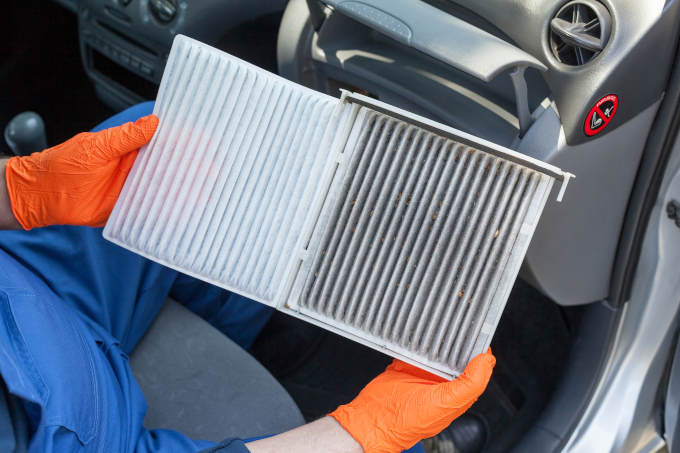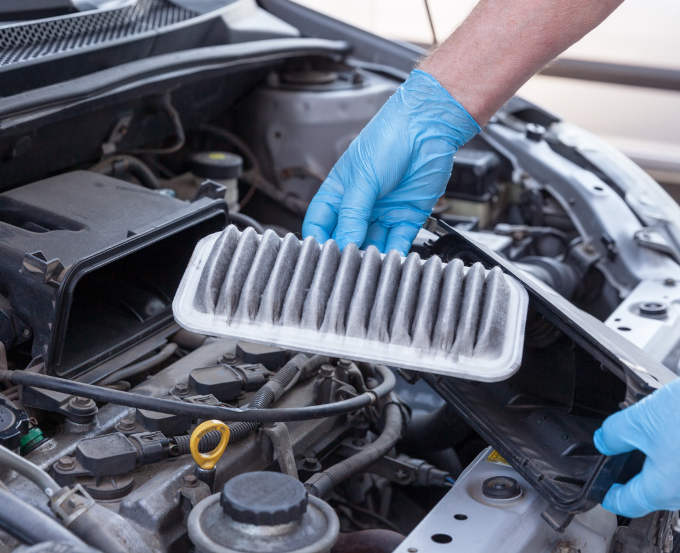Your vehicle has seven filters and devices critical to its proper function and aid in the driver’s and passengers’ health and comfort. These include a cabin air filter, oil filter, engine air filter, fuel filter, transmission filter, and emission (PVC) valve and breather element. In this article, we will discuss the purpose of each, why they should be routinely changed, and some of the warning signs of a clogged filter that you may observe.
Cabin Air Filter
A cabin filter is responsible for cleaning the air that enters your vehicle’s interior through the air conditioning system. It protects your interior from dust, pollen, mold, and other undesirable elements and allergens. If you have a carbon activated cabin filter, exhaust gasses and odors will also be addressed.
A clogged cabin filter will affect the airflow to your vehicle’s interior and often decrease air quality. It will also negatively impact your vehicle’s ability to defog windows. Regularly changing your cabin air filters may also help extend the life of your vehicle’s air conditioning system. It is recommended that you follow your owner's manual for when to change your cabin air filter, though most manufacturers recommend every 15,000 to 25,000 miles or at least once per year. Unusual odors and a musty scent are signs that you need to change your cabin air filter.
Oil Filter
An oil filter works to keep dirt and debris out of your engine. For your engine to function efficiently, oil is used as a lubricant for essential parts to move smoothly. Upon entry into the system, this oil is clean; however, it degrades over time as it picks up dirt and debris. Your oil filter should be changed whenever you change your engine oil.
If you fail to change your oil filter, impurities may get into your engine. These impurities can lead to your engine’s premature wear, reduced performance, and possible engine failure. Some of the warning signs of a needed oil change are excessive exhaust, falling oil levels, increased engine noise, irregular oil texture, check engine light, and decreased gas mileage.
Engine Filter (Air Filter)
Your car needs air to run. An engine filter manages this air by removing the contaminants from it as it flows to your car’s engine. A clean air filter will ensure that your vehicle performs at its highest level. If your air filter is clogged, it can result in slouchy acceleration and reduced fuel economy.
To know how often you should change your air filter, consult your owner’s manual. The standard recommendation for a disposable air filter change is no more than 30,000 miles of normal driving conditions. Signs of a dirty engine filter include low gas mileage, a misfiring engine, strange engine sounds, the presence of a service engine light, a reduction in horsepower, black smoke exiting the exhaust, and the smell of gasoline.
Fuel Filter
A fuel filter protects your fuel injectors by removing impurities such as dust, rust, and grit in fuel, helping maintain your engine’s smooth performance. A fuel filter also helps enhance the longevity of your engine. Weakened performance and an inefficient flow will result from a clogged fuel filter. If not replaced routinely, expensive parts can become damaged, potentially leading to your fuel pump and other components becoming damaged.
The major warning signs of a dirty fuel filter include difficulty starting your car, struggling at low speeds, and shaky idling, sputtering or stalling. Be sure to watch for these signs and change your fuel filter according to your owner’s manual.
Transmission Filter
Transmission filters catch debris that might be present in the fluid of your transmission. Over time, small metal shavings and other grit can build up in your transmission filter. You should follow your owner’s manual for specific recommended maintenance intervals, but generally speaking the transmission filter and fluid should be replaced every 30,000 to 100,000 miles depending on how you use your vehicle, its make, model, and mileage.
Signs that indicate that you may need to change your transmission filter include rattling, whirs or whines, leaking, a burning smell, issues changing gears, and a noisy neutral. Your car’s transmission filter should be changed based on the frequency suggested in your car’s manual. If you fail to do this, you could risk damaging your transmission.
(PCV) Valve and Breather Element
The other two devices in your vehicle are an emission Positive Crankcase Ventilation (PCV) valve and breather element. These two components work together and are also critical to the proper function of your vehicle. If a PCV valve malfunctions, it could affect your vehicle’s performance and emissions management, causing a rough idle, engine issues, and decreased performance. The breather element works with the PCV valve to manage the ventilation of your car’s crankcase. It also works to reduce toxic vapor emissions.
Keeping Your Filters Top of Mind
While filters are not always at the forefront of a driver’s mind when it comes to vehicle maintenance, they play a significant role in a vehicle’s health and vitality. The seven filters and devices discussed above should be regularly serviced to ensure your vehicle’s proper function. To avoid damage to your car from dirty filters, get them serviced frequently, watch out for the warning signs, and consult your vehicle’s manual.










